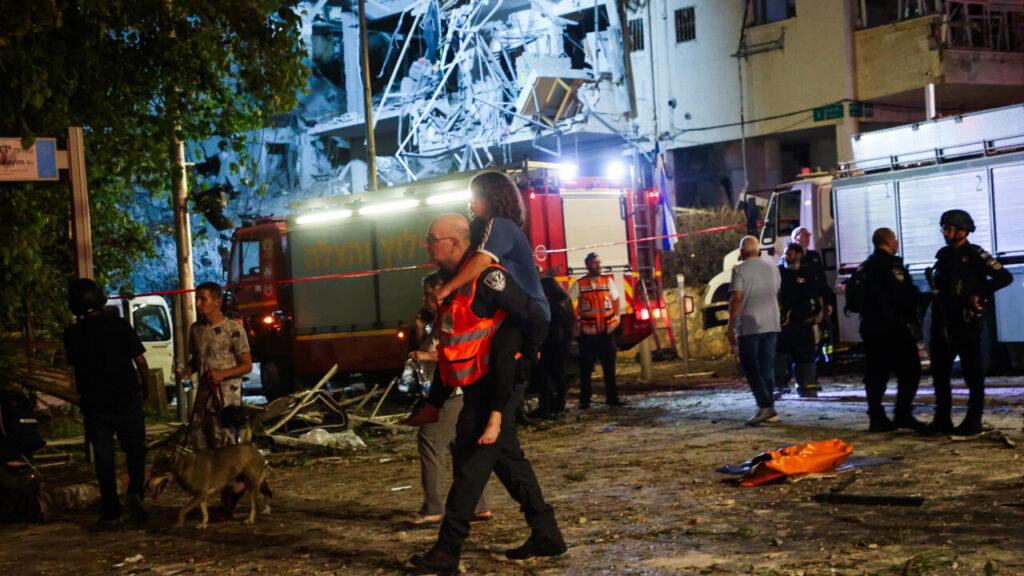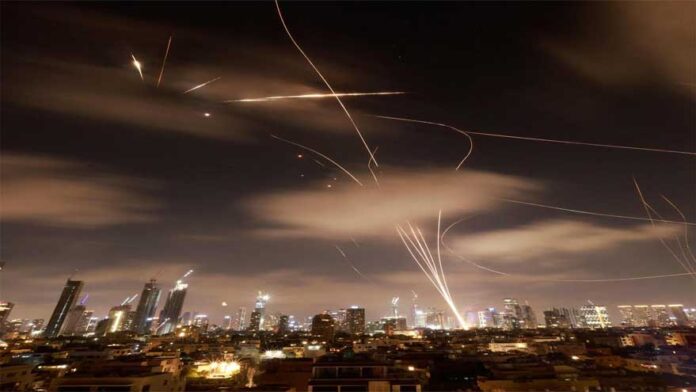Explosions Reported in Doha as Iran Targets U.S. Bases in the Middle East
Multiple explosions were heard over the capital of Qatar, Doha, on Monday after Iran launched missiles at the U.S.-operated al-Udeid Air Base in the Gulf region. In response, Qatari authorities announced a temporary closure of the country’s airspace to safeguard both residents and visitors. Prior to the strikes, the U.S. embassy in Qatar had advised American citizens to shelter in place, citing safety concerns.
Iran also confirmed it launched a missile targeting a U.S. military installation in Iraq. These missile strikes were part of a broader retaliatory campaign following recent U.S. airstrikes on Iranian territory that struck three nuclear-related facilities. Iran has named the operation “Annunciation of Victory,” signaling a larger regional response.
Iran’s elite Islamic Revolutionary Guard Corps (IRGC) confirmed the attacks, stating that the strikes were in direct retaliation to recent actions taken by U.S. forces. Qatar reported that there were no casualties from the missile attack on its soil but emphasized its sovereign right to respond as necessary.
Additionally, both Qatar and the United Arab Emirates temporarily closed their airspace amid rising security concerns.
Earlier, a senior Iranian military official vowed that Tehran would take decisive action following the U.S. strikes. He described the American attacks as both criminal and disrespectful, warning that they would not go unanswered.
Meanwhile, conflict between Israel and Iran has escalated, with a fresh round of missile exchanges reported. Israel targeted Iran’s Fordow nuclear site and other locations, marking the eleventh consecutive day of hostilities. Air raid sirens were activated across several Israeli cities as Iranian missiles were launched toward Israeli territory.
Israel’s defense authorities confirmed that their military had launched new strikes against Tehran, including an operation targeting Evin Prison, a facility known to house political dissidents and critics of the Iranian regime. Israeli leaders shared footage of the strikes on social media, celebrating them as blows to authoritarian repression.
Civilian Casualties in Iran Rise
According to Iranian health officials, at least 13 children and 44 women, including two who were pregnant, have been killed since the onset of the Israeli offensive on June 13. The youngest child killed was reportedly only two months old. In total, over 400 people have died, and more than 3,000 others have been wounded, the vast majority of whom are civilians.

Trump Maintains Interest in Diplomacy but Urges Regime Change
Former U.S. President Donald Trump, while expressing continued interest in diplomatic engagement with Iran, suggested that the Iranian people should consider changing their government if leaders refuse to enter peaceful negotiations. His administration’s stance is that diplomacy remains a preferred path, though it also supports more forceful approaches if deemed necessary.
Trump also called for efforts to stabilize global oil markets amid fears that continued regional conflict could drive up prices. In a social media post, he urged energy producers to increase drilling and avoid playing into the hands of geopolitical rivals.
Iran’s Former Royal Family Seeks Peaceful Transition
Reza Pahlavi, son of Iran’s last monarch who was overthrown in 1979, has once again offered to help lead a peaceful, democratic transition in Iran. Speaking from abroad, he emphasized his desire to guide Iranians toward stability, justice, and freedom through civil disobedience and a national referendum. He declared he does not seek power, only to serve the nation during its time of crisis.
Russia Condemns Strikes, Offers Support
Russia strongly criticized the recent strikes on Tehran, labeling them as unjustified acts of aggression. The Russian leadership reiterated its commitment to assisting the Iranian people and expressed concern over escalating tensions.
Iran Issues Direct Warning to Trump
Iran responded to the U.S. attacks by declaring that its armed forces would now consider a broader range of American assets as valid targets. The Iranian military described Trump as a “gambler” for supporting Israeli military efforts against Iran and vowed to end any conflict he might initiate.
Despite continuing to fire missiles into Israel, Iran has so far refrained from launching direct attacks on U.S. military positions or oil infrastructure in the Persian Gulf. However, military officials in Tehran warned that retaliation is still on the table.
Continued Exchange of Fire Between Iran and Israel
Iran and Israel engaged in yet another series of missile and airstrikes. Israel claimed to have targeted military installations in both western Iran and Tehran, including radar systems and air defense facilities. Iranian media reported that air defense systems in central Tehran had been activated, and strikes had also occurred near sensitive military zones.
Iranian authorities stated that more than 400 civilians have been killed in Israeli attacks, though they have released few images of the aftermath. Many residents of Tehran have evacuated the city for rural areas due to the ongoing risk of missile strikes.
In response, Iranian missiles reportedly killed 24 people in Israel and injured hundreds—marking a rare occasion where Iranian missiles successfully breached Israeli defenses.
Sirens rang out for over 30 minutes across Israeli cities, signaling incoming missile attacks from Iran. Civil defense teams were dispatched to assess damage and assist victims in multiple locations.
Limited Retaliation and Global Oil Market Reaction
Iran’s military response remains somewhat constrained, particularly following setbacks to its regional allies. Israel has recently weakened Iran’s major proxy groups, including Hezbollah in Lebanon and Syria’s Assad regime.
One of Iran’s most significant remaining options is to disrupt global oil trade by restricting access to the Strait of Hormuz—a vital maritime route through which 20% of the world’s oil supply passes. On Monday, global oil prices briefly spiked above $80 a barrel before stabilizing at around $76.
Iran’s parliament has approved a proposal to close the strait, though this would require approval from the Supreme National Security Council. Analysts warn that any attempt to block the strait could trigger severe economic consequences and provoke a military response from the U.S. Navy, which maintains a large presence in the Gulf.
Diplomatic Efforts Underway
Iran’s foreign minister traveled to Moscow to meet with Russian leaders and deliver a message from Iran’s supreme leader, requesting stronger support. Iran reportedly expressed disappointment in the limited help received thus far and is seeking more active backing from Russia in its confrontation with the U.S. and Israel.
Although Russia has condemned the Israeli strikes, it has not commented extensively on the U.S. attacks. Russian officials reiterated the importance of de-escalation and proposed resuming diplomatic talks on Iran’s nuclear program, while safeguarding Iran’s right to peaceful nuclear energy.
Putin assured Iran that Russian workers helping construct nuclear reactors at Bushehr would not be targeted in the conflict. However, Russia appears reluctant to escalate tensions further with the United States, especially as it continues to focus on its own military operations elsewhere.
Other Global Reactions
Australia voiced support for U.S. strikes on Iran’s nuclear facilities, emphasizing the global consensus that Iran must not obtain nuclear weapons. At the same time, Australian officials urged restraint to prevent a wider conflict.
North Korea also condemned the U.S. strikes, calling them a clear violation of international law and blaming Israel for escalating the situation.
Meanwhile, U.S. leaders called on China to use its influence with Iran to discourage any move to close the Strait of Hormuz. Officials warned that such a move would damage not just the U.S. economy, but global trade as a whole, and would invite strong international pushback.
U.S. Says Its Objective Is to Halt Iran’s Nuclear Program, Not Instigate War
The U.S. government has repeatedly stated that its intent is focused solely on dismantling Iran’s nuclear capabilities, not on widening the conflict.
However, in a recent social media post on Sunday, the former U.S. President publicly referred to a “regime change” in Iran, suggesting that if the current leadership cannot “MAKE IRAN GREAT AGAIN,” then a change in regime would be justified. He emphasized this by writing:
“It’s not politically correct to use the term ‘Regime Change,’ but if the current Iranian Regime is unable to MAKE IRAN GREAT AGAIN, why wouldn’t there be a Regime change??? MIGA!!!”
He also celebrated the military action, calling the successful strike a “Bullseye!!!” and adding, “Monumental Damage was done to all Nuclear sites in Iran … far below ground level.”
Additional Israeli Airstrikes Launched
In parallel, Israel has escalated its offensive inside Iran since launching a surprise strike on June 13 that reportedly killed several high-ranking military officials. On Monday, the Israeli military deployed around 20 fighter jets to attack military installations in western Iran, Kermanshah, and Tehran, targeting missile systems, radar, and air-defense units. Local authorities reported that air defenses were active over central Tehran and that Parchin—home to a military complex southeast of the capital—was struck.
Iranian officials claim that over 400 people have died in these Israeli strikes, with civilian casualties constituting the majority. Many residents of Tehran have evacuated the city out of fear.
On the Iranian side, retaliatory missiles launched at Israel have resulted in 24 civilian deaths and hundreds of injuries—marking a rare instance where Iranian missiles breached Israel’s defense systems. Sirens sounded across Israeli cities for more than 30 minutes while air-raid warnings were in effect; rescue teams have since responded to multiple impact sites.
Strategic Constraints and Economic Effects
Iran’s options for retaliation appear limited. Regional groups supported by Iran, such as Hezbollah and forces in Syria, have been weakened by recent Israeli operations. One of Iran’s most significant remaining strategic tools is its ability to threaten the Strait of Hormuz, through which 20% of global oil shipments pass. On Monday, global oil prices briefly exceeded $80 per barrel before settling back near $76.64.
Iran’s parliament has approved a motion to close the strait, but any final decision awaits approval by the country’s Supreme National Security Council. International analysts warn that any attempt to block this crucial shipping lane could provoke widespread economic fallout and possible confrontation with the U.S. Navy, which patrols the region.
Diplomatic Engagement with Russia
Iran’s foreign minister traveled to Moscow to meet with the Russian President and deliver a message from Iran’s Supreme Leader, seeking greater support. While Russia criticized Israeli strikes, it has remained more reserved regarding U.S. actions but did offer to mediate the nuclear dispute. Russia also assured that its personnel working at Iran’s nuclear sites, including in Bushehr, will be protected. Despite this, Tehran has expressed disappointment in the level of Russian backing received so far.
Global Reactions
- Australia: Supported the strikes on nuclear targets but urged world leaders to prevent full-scale war.
- North Korea: Strongly condemned the U.S. strikes as a violation of international law, blaming them on broader regional aggression.
- U.S. Officials: Called on China to press Iran not to close the Strait of Hormuz, warning such a move would cause economic harm both regionally and globally and may prompt a military response.



